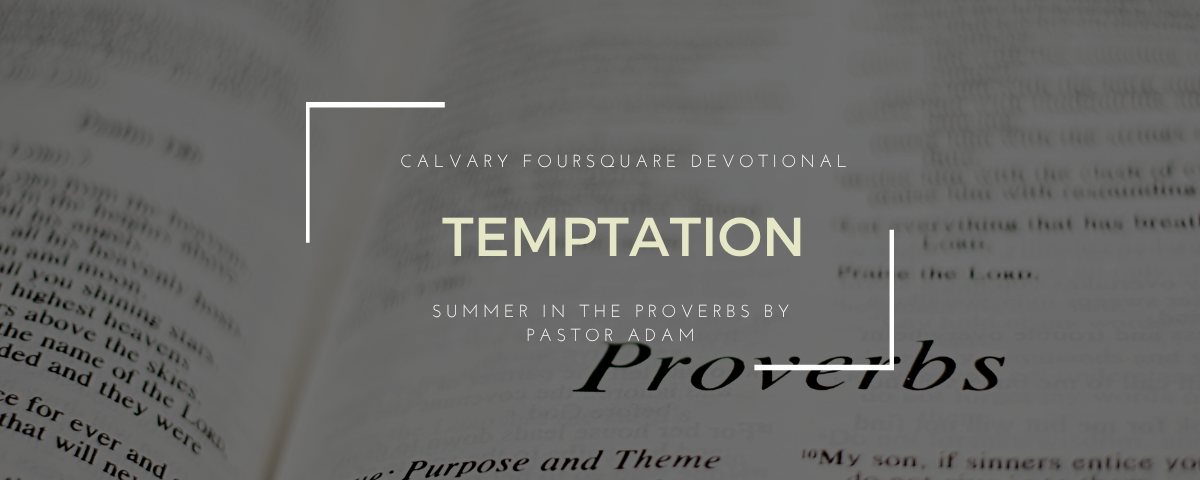
Don't Fall for the Trap: A Warning from Proverbs on Avoiding Sin
The book of Proverbs is a gift of understanding, discernment, and wisdom. It’s not a checklist for every situation in our modern lives—Solomon didn't have to worry about the internet or indoor plumbing. But what he did give us is far more valuable: a framework for how to think so we can apply God's wisdom to every situation we face.
Today, we're diving into Proverbs 7, a powerful passage where a father gives his son a clear warning about the seductive nature of sin. He paints a picture we can all relate to, showing us the tactics of temptation and the devastating consequences of falling into the trap.
As the old saying goes: Sin will take you further than you want to go, keep you longer than you want to stay, and cost you more than you want to pay.
1. The Slow Drift into Danger
Solomon begins his story by watching from his window. He sees a young man "lacking sense," walking down a street at twilight, a place and time he shouldn't be.
This is often how temptation begins—not with a sudden leap, but with a slow, seemingly harmless drift. The young man wasn't planning to go to the woman’s house; he was just "strolling down the road to her house." He was dabbling, hoping to catch a glimpse, telling himself it was just a little detour.
But we know where that path leads. In our own lives, it’s the little compromises: staying up too late, scrolling through social media when we know we should be working, or putting ourselves in a situation "just to see."
Physiology research even backs this up: after midnight, our decision-making abilities are impaired. Our executive functions dim, making us more susceptible to poor choices. As the saying goes, "Nothing good happens after 10 p.m." We are most vulnerable when we are in the wrong place at the wrong time.
2. The Bait is Always on Display
Next, the story introduces the temptress herself. She is "dressed like a prostitute," with "a hidden agenda." She is loud, defiant, and available.
This imagery is a powerful metaphor for sin. The "rewards" of sin are always on display, glittering like a lure on a fishing line. The bait is all shine and color, full of promises of pleasure and satisfaction. But you never see the hook.
-
Theft promises an easy profit.
-
Pornography promises pleasure.
-
Drugs and alcohol promise joy and an escape from pain.
Sin puts all the good stuff on display for free. "I've let you see this much," it whispers. "Don't you want the rest?" But the purpose of the bait is the hook, and the hook always comes with a price.
3. The Devil’s Lies
Once the young man has made himself available, the temptress moves in. She grabs him, kisses him, and begins to pour out a stream of lies designed to break down his resistance.
"I’ve made fellowship offerings; today I’ve fulfilled my vows," she says. "It's okay! God is taken care of. I go to church!"
The greatest lies often contain a grain of truth, but they are designed to give us permission to sin. The enemy is a liar and the "father of lies" (John 8:44). He will say:
-
"This isn't that bad. Everyone does it."
-
"No one will ever know."
-
"This is what you deserve. This is what you need."
She tells the young man that the experience will be "love" and that her husband is away on a long journey, meaning no one will ever find out. These two lies are at the heart of nearly every sin we commit: the promise of fulfillment and the promise of secrecy. Both are far from the truth.
4. The Deadly Consequence
The young man, seduced by her flattery and lies, follows her "like an ox going to the slaughter." He doesn't realize it will cost him his life.
Solomon's message is clear and chilling: her house "is the road to Sheol, descending to the chambers of death." Sin is not a harmless detour; it is a path to destruction.
How to Fight Back
Solomon’s advice is timeless. We need to:
-
Establish a relationship with Wisdom. Treat God's Word as your closest confidante and friend.
-
Establish boundaries and actively avoid temptation. Don't go near the house. Don't be in the wrong place at the wrong time.
-
Develop accountability. Find a few trusted people in your life who you can be honest with. Tell them your struggles and temptations. Shining a light on temptation is the first step to defeating it.
When we mess up, the answer isn’t to hide in shame. It's to repent—to turn away from the sin and back to God.
Sin is a powerful enemy, but God's grace is more powerful. With wisdom, boundaries, and accountability, we can live a life that avoids the trap and honors the One who gives us true life.
